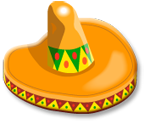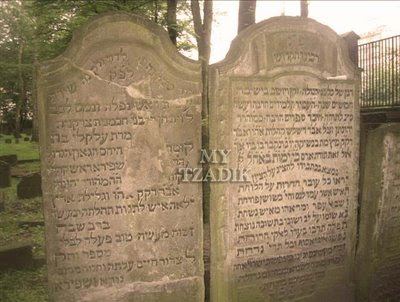
The initials of the Hebrew letters spell out...
תשס"ט
תהא שנת סימן טוב
"May This Year be a Good Sign!"
We also await for a king of flesh and blood to appear and take us out of our current exile... But... it seems, we're too taken in by the latest designer clothing especially the styles of hats available!
Who could this Moshiach be? What does he look like? What type of clothes is he wearing?
What type of head covering does he wear?
And maybe that's why he just hasn't revealed himself yet!
Instead, as we sit this Rosh HaShanah praying to G-d, we could take a moment and shift gears.
As we look around at each other - and especially at the real possibility of the Moshiach revealing himself immediately, let us remove our differences and our imaginations at what should actually be, and instead, let G-d run the world, bring Moshiach, and take us out of this doubled and re-doubled darkness we are ALL currently in.
MOSHIACH'S HAT
'Twas the night of the Geulah, -- And in every single Shtiebel
Sounds of Torah could be heard -- Coming from every kind of Yeedel.
This one in English, -- Some in Hebrew, some in Yiddish.
Some saying P'shat -- And some saying a Chiddish.
And up in Shamayim--The Aibishter decreed:
“The time has come -- For My children to be freed.
“Rouse the Moshiach -- From his heavenly berth.
Have him get in his chariot, -- And head down to earth!”
The Moshiach got dressed -- And with a heart full of glee,
Went down to earth and entered -- the first Shtiebel he did see.
“I am the Moshiach! -- Hashem has heard your plea!
“Your Geulah has come! -- It's time to go free!”
They all stopped their learning; -- This was quite a surprise.
And they looked at him carefully, -- With piercing sharp eyes
“He's not the Moshiach!” -- Said one with a grin,
“Just look at his hat, -- At the pinches and brim!”
“That's right!” cried another -- With a grimace and frown,
“Whoever heard of Moshiach, -- With a brim that's turned down?”
“Well,” thought Moshiach, -- “If this is the rule,
“I'll turn my brim up -- Before I go to the next shul.”
So he walked right on over -- To the next shul in town.
Sure to be accepted, -- Since his brim was no longer down.
“I'm, the Moshiach!” he cried, -- As he began to enter
But the Jews wanted to know first -- If he was Left, Right or Center
“Your clothes are so black!” -- They cried out in fright.
“You can't be Moshiach--You're much too far right!”
“If you want to be Moshiach, -- You must be properly outfitted.”
So they replaced his black hat -- With a Kippah that was knitted.
Wearing his new Kippah, -- Moshiach went out and said:
“No difference to me -- What I wear on my head.”
So he went to the next shul, -- For his mission was dear.
But he was getting frustrated -- With the Yidden down here.
“I'm the Moshiach!” he cried, -- And they all stopped to stare,
And a complete eerie stillness -- Filled up the air.
“You're the Moshiach?! -- Just imagine that!
“Whoever heard of Moshiach -- Without a black hat?”
"But I do have a hat!" -- The Moshiach then said.
So he pulled it right out -- And plunked it down on his head.
Then the shul started laughing, -- And one said “Where's your kop?
“You can't be Moshiach -- With a brim that's turned up!”
“If you want to be Moshiach -- And be accepted in this town,
“Put some pinches in your hat -- And turn that brim down!”
Moshiach walked out and said: -- “I guess my time hasn't come.
“I'll just return -- To where I came from.”
So he went to his chariot, -- But as he began to enter,
All sorts of Jews appeared -- From the Left, Right, and Center.
“Please wait - do not leave. -- It's all their fault!” they said,
And they pointed to each other -- And to what was on each other's head.
Moshiach just looked sad -- And said, “You don't understand.”
And then started up his chariot -- To get out of this land.
“Yes, it's very wonderful -- That you all learn Torah,
“But you seem to have forgotten -- A crucial part of our Mesorah.”
“What does he mean?” – “What's he talking about?”
And they all looked bewildered, -- And they all began to shout.
Moshiach looked back and answered, -- “The first place to start,
“Is to shut up your mouths -- And open your hearts.
“To each of you, certain Yidden -- Seem too Frum or too Frei,
“But all Yidden are beloved -- in the Aibishter's eye.”
And on his way up he shouted: -- “If you want me to come,
Try working a little harder -- On some Ahavat Chinam!”












